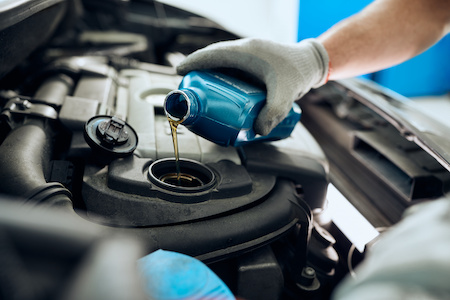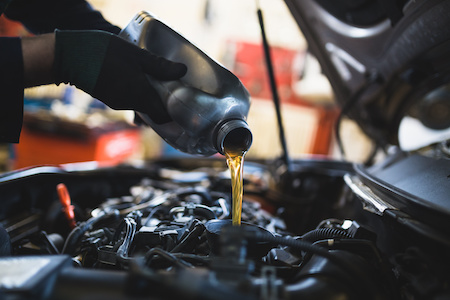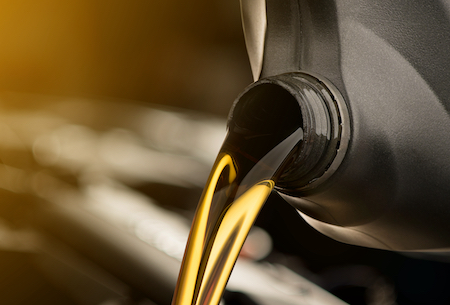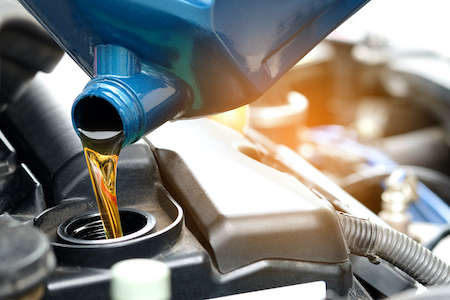You know car maintenance is important. Some projects easily filter into your to-do list – you no longer have to think about them.
Like stopping for gas. Or ensuring your tires are properly pressurized.
Or changing the motor oil.
Most of us stop for an oil change when the little sticker in the window tells us we’ve reached a specific mileage. But have you ever stopped to think about why? Or what’s in motor oil that makes it beneficial for your vehicle? (Yes, motor oil additives are essential!)
Let’s dig in!
This is why your car needs motor oil
Motor oil is also referred to frequently as engine oil. It’s a lubricant used in internal combustion engines to reduce friction and wear between moving parts.
It’s designed to lubricate the engine components, such as the pistons, bearings, and camshaft, to ensure smooth operation and minimize friction-related heat. It also helps:
- Dissipate heat generated during engine operation, preventing components from overheating.
- Keep the engine clean by carrying away contaminants and deposits, preventing sludge build-up and maintaining engine cleanliness.
- Form a film between the moving parts, helping to create a seal and prevent leaks.
- Provides a protective layer to prevent corrosion of engine components.
Now imagine what would happen if you didn’t add motor oil regularly.
Every part would be impacted. The friction and wear would occur gradually over time as each part moved a little slower, and didn’t work quite as designed.
More friction means more heat. If you drive a lot and this continues, heat may build and lead to overheating. And that can bring a lot of problems inside the engine compartment.
This doesn’t happen quickly. Instead, it’s a slow build-up of sludge, dirt, and debris, gradually contaminating the motor oil and negatively impacting the engine. Which leads to poor fuel efficiency, increased emissions, more costly repairs, and eventual engine failure.
Whew!
All from not paying attention to your motor oil. Who knew a little can of motor oil could do so much for your car.
What’s in a can of motor oil?
Here’s where it gets interesting. Motor oil is more than just another liquid.
New, clean motor oil is typically amber or light brown. However, as it ages and accumulates contaminants, it can darken and appear black. The color can also be influenced by the additives and base oil used in the formulation. High-quality synthetic oils may have a clearer, lighter color.
You may notice its mild, characteristic petroleum odor. However, as oil ages and accumulates contaminants, it may develop a stronger, more unpleasant smell. The presence of burnt or acrid odors could indicate overheating or other issues within the engine.
Motor oil is designed to have a specific viscosity, which is a measure of its thickness or resistance to flow. It’s often labeled with two numbers, such as 10W-30. The first indicates the oil’s viscosity at low temperatures, while the second indicates the viscosity at high temperatures. The consistency can range from relatively thin to more viscous, depending on the oil’s intended use and operating conditions.
What’s in motor oil? It can vary depending on the specific formulation, brand, and intended use (conventional, synthetic, or a blend). However, motor oil typically consists of a base oil and additives. Here’s what’s in each:
Base Oil
The base oil is the primary component of motor oil and makes up the majority of its volume. It can be derived from crude oil or synthesized chemically. The base oil provides the lubricating properties necessary to reduce friction and wear between moving engine parts. The quality and type of base oil (conventional, synthetic, or semi-synthetic) significantly influence the performance of the motor oil.
Additives
Motor oil contains various additives to enhance its performance and provide additional benefits. These additives include:
- Detergents and Dispersants – These additives help keep the engine clean by preventing the formation of deposits and sludge. They disperse and suspend contaminants, allowing them to be carried away during oil changes.
- Anti-Wear Agents – These additives form a protective film on metal surfaces, reducing friction and minimizing wear on engine components.
- Viscosity Index Improvers – These additives help stabilize the viscosity of the oil over a range of temperatures. This ensures that the oil maintains its effectiveness in lubricating the engine under different operating conditions.
- Antioxidants – These additives help prevent the oil from oxidizing and breaking down, extending the oil’s life and maintaining its properties over time.
- Corrosion Inhibitors – These additives protect engine components from corrosion by forming a protective layer on metal surfaces.
- Foam Inhibitors – These additives help prevent the formation of foam, ensuring efficient lubrication and preventing air entrainment in the oil.
- Pour Point Depressants – These additives improve the low-temperature flow characteristics of the oil, preventing it from thickening in cold conditions.
- Friction Modifiers – These additives reduce friction between moving parts, improving fuel efficiency.
Why your car needs motor oil additives
With everything we do and have in our world today, we can look back over time and see how it’s a little better than in the past. We learn. We grow. And we make things better.
Motor oil has had that progression, too.
Go back to the very first cars and motor oil was a base ingredient with little in it. Over time, we’ve learned to add things that make it better – better for your car, better for the environment, better for efficiency.
Today’s motor oil additives are essential team players dedicated to keeping your car’s engine in top shape. These additives each contribute unique benefits.
Take the detergent and dispersant combo, for instance. They actively prevent the accumulation of deposits and sludge, maintaining the engine’s cleanliness. What was once difficult or even impossible, today is handled through additives within the motor oil itself.
Then there’s the anti-wear agent, a vital component forming a protective layer on metal surfaces, minimizing friction and preventing premature wear on critical engine parts. That’s just one reason the average age of a car on the road is creeping upwards every year.
Yes, additives are a good thing. Your car’s engine can’t survive without motor oil. But increasingly, it can’t function well over time without motor oil additives.
While you might not have a deep understanding of motor oil and its job, hopefully, this provides you with a little more information about its importance.
Changing motor oil regularly is essential to the health of your vehicle.
We can help you with that.
It’s the best way to ensure a longer, healthier life for your engine.







 Synthetic motor oil is a human-made lubricant created by artificial chemical compounds as a substitute for petroleum-based oils.
Synthetic motor oil is a human-made lubricant created by artificial chemical compounds as a substitute for petroleum-based oils. Without the proper motor oil inside your vehicle, it’ll quickly wear down various parts.
Without the proper motor oil inside your vehicle, it’ll quickly wear down various parts. That makes motor oil pretty important, right?
That makes motor oil pretty important, right? Question: My check engine light is on and my boyfriend thinks he can get the code read and know what part to replace to fix my car. I say it’s not that simple. Who’s right?
Question: My check engine light is on and my boyfriend thinks he can get the code read and know what part to replace to fix my car. I say it’s not that simple. Who’s right?